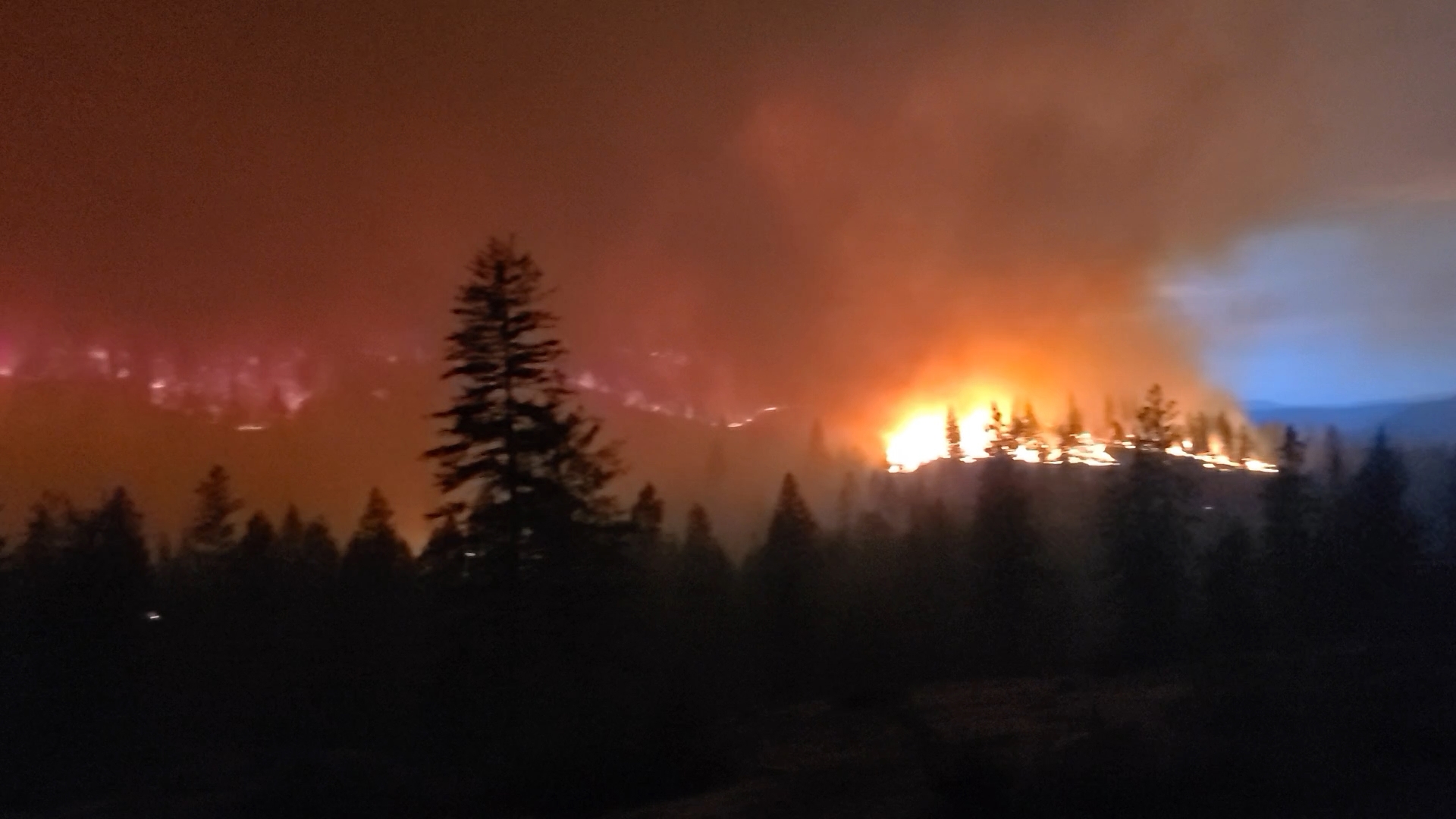FOX ISLAND, Wash. — Despite hearing an evacuation order for the Ford Corkscrew Fire north of Spokane, John Lowe stayed and fought the wildfire charging over the hillside and toward his home in 2021.
“When it came up over that ridge over here, it sounded like a tornado coming. A freight train," Lowe said. "It went up and over this house, like a tsunami of fire."
Thirty homes were destroyed; Lowe watched his neighbor's house melt under the heat. At that point, he said he was just protecting himself.
His home, outfitted to withstand wildfire, is among the 48 saved by the Stevens County Fire Department. It's a well-trained outfit that rolled up Lowe’s driveway as fire closed in.
Stevens County Fire Chief Mike Bucy said they have a great record of success. His team fought 41 wildland fires this season, no homes burned and that’s the average. It’s partly due to their investment in specialized equipment like a custom designed wildfire tender — something that looks like a monster truck — that carries 2,500 gallons of water.
“But none of that gets any recognition,” said Bucy.
Insurance rating system impacts rural, city residents
After investing millions of dollars in equipment, hours of training and a proven record of saving homes, none of it matters to insurance companies, Bucy said. The state-mandated organization that analyzes fire risk to buildings ignores their successes with battling wildfires, he added.
“They just want to turn around and blame homeowners,” said Bucy.
To help determine premiums, and whether you can get homeowners insurance, the Washington Surveying and Rating Bureau (WSRB) gives each community a rating between one and ten. A rating of an eight, nine or 10 is the worst meaning homeowners there will have a tough time getting insured.
“It’s almost criminal not to include fire district capabilities in that matrix," Bucy said. “The risk is relatively low to what they’re claiming."
Homeowners and fire chiefs say the rating system is faulty: that it’s being used by insurance companies to hike up costs and drop homeowners, especially if you live in a rural area. The system favors big cities, they said, by using criteria like numbers of hydrants, water supply, and building codes – things that are important in a city. In rural areas, one of the main factors of success is fighting wildfires, yet the rating system barely takes that into consideration.
The WSRB told KING 5 that fighting wildfires accounts for less than 5% of the overall rating.
The area where Steven’s County saved John Lowe’s house gets a lousy 7 rating, despite the department’s strong record with wildfires.
“When we were rated, we found out that that really didn’t mean anything,” said Bucy.
President and CEO of the rating bureau, Karl Newman, said the company is constantly reevaluating its rating structure. Newman said insurance companies aren’t asking them to include wildfire information and if homeowners are getting dropped, it’s not because of their rating system. The Surveying and Rating Bureau is funded by the insurance industry.
“There are fire chiefs asking us to do more in relation to wildfire. Our customer and the people paying for that data and information are the insurance companies and they aren’t asking us to do that," Newman said. "Wildfire is not a major part of what we do."
It’s not just a controversy in eastern Washington, but on the western side of the mountains, too.
Surrounded by water, part of Fox Island near Gig Harbor has a nine rating, about as bad as a city can get. According to the rating bureau, that nine was dished out after its volunteer fire department went to being staffed part-time.
'They throw their fire department under the bus'
Doug Nelson is a former volunteer firefighter. He said that change hasn’t hurt response times; the response times are the same, if not better. But when the rating went up, so did his insurance premium by 30%.
“The only explanation I was given in the last couple years is the wildfires,” said Nelson.
Like many of his friends on the island, Nelson is on a fixed income. “I only get so much a year coming in and that’s not going to change for the rest of my life," he said. "When those two bills start increasing, that takes a big chunk out of what my monthly income is.”
Chief Dennis Doan is the top boss of the Gig Harbor Fire Department and a leader with the Washington State Association of Fire Chiefs. He said the rating system needs an overhaul. The association is crafting legislation to create more oversight and, according to him, a more reasonable rating system.
“I am just so frustrated with the metrics that insurance companies use and the different metrics they use. Then what really frustrates me is they throw their fire department under the bus,” said Doan.
Back in Loon Lake, near Spokane, wildlife is slowly coming back three years after the wildfire decimation.
“Nature is going to come back," Lowe said. "It has and it did."
The chief of the department, Mike Bucy, said the rating system needs to be adapted as well: with the goal of bringing fairness to the homeowners of Washington State.

